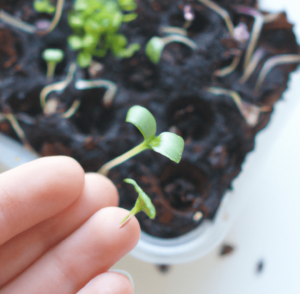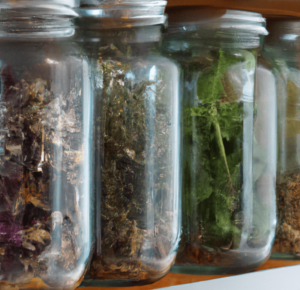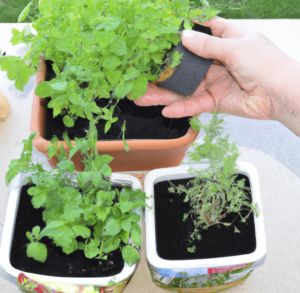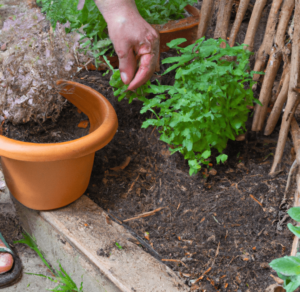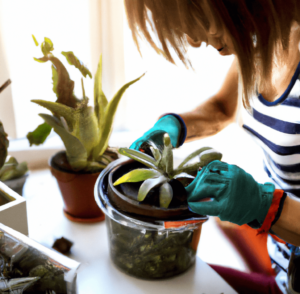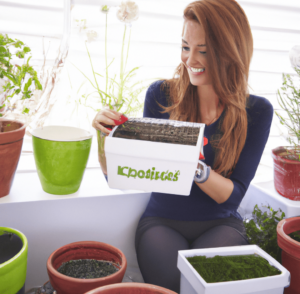Herb gardens have been a popular addition to home landscapes for centuries, offering both visual appeal and practical use. An herb is a plant that is valued for its medicinal, aromatic, or culinary qualities, and many people enjoy growing their own herbs to add flavor to their cooking, create natural remedies, or simply enjoy the beauty and fragrance of these plants. Herb gardens can be small and contained in pots or containers, or they can be a part of a larger, traditional garden layout. Regardless of size or location, herb gardens offer numerous benefits for gardeners and those who appreciate the versatility and flavor of herbs.
Herb plants are diverse and can range from small, delicate annuals to sturdy perennials. Some common herbs include basil, rosemary, oregano, thyme, mint, and cilantro. Growing herbs can be easy and rewarding, as they often require minimal care and can thrive in a variety of environments. Many herbs are drought-tolerant and can thrive in full sun or partial shade. Some herbs, such as mint and chamomile, can even be grown indoors.
Gardeners of all skill levels can enjoy the benefits of an herb garden. Whether you are a seasoned green thumb or just starting out, there are herb varieties that are suitable for any level of experience. Herbs are also a great choice for gardeners with limited space, as they can be grown in pots or containers and can even be grown indoors.
In addition to their practical uses, herb gardens are a delight for the senses. The fragrant leaves and flowers of herbs add a lovely aroma to any outdoor space, and the vibrant colors and textures of herb plants can add interest and beauty to any garden. Whether you are using herbs for cooking, natural remedies, or simply for their beauty, an herb garden is a wonderful addition to any home.

A Place for Plants and Herbs
Gardens are a great place for growing a variety of plants and herbs. Whether you have a large backyard or a small balcony, there are plenty of options for cultivating your own greenery. Not only do plants and herbs add beauty and life to your outdoor space, but they can also provide a tasty and flavorful addition to your kitchen.
Herbs are a popular choice for gardens because they are easy to grow and add a unique flavor to dishes. Common herbs include basil, oregano, and parsley, but there are many others to choose from depending on your taste preferences. These herbs can be grown in pots or in a dedicated herb garden bed.
In addition to herbs, many people enjoy growing a variety of vegetables and fruits in their gardens. From tomatoes and peppers to berries and apples, there are countless options for adding fresh produce to your meals.
Whether you are an experienced gardener or just starting out, the process of growing plants and herbs can be rewarding and fulfilling. Not only do you get to enjoy the beauty and benefits of your garden, but you also have the satisfaction of knowing that you grew your own food. So why not give gardening a try and see what you can grow?
Creating an Herb Garden
Herbs are a great addition to any garden, whether you have a large outdoor space or a small indoor windowsill. Not only do they add flavor and nutrition to your cooking, but they can also serve as natural remedies and have a pleasant aroma.
Plants in the mint family, such as basil, rosemary, and thyme, are particularly easy to grow and make excellent choices for a beginner herb garden. Other herbs that are relatively low maintenance and thrive in a variety of climates include chives, oregano, and parsley.
Gardening can be a relaxing and rewarding hobby, and growing your own herbs allows you to have fresh ingredients at your fingertips. An herb garden can be as simple or elaborate as you like, and there are many different ways to design and care for one.
To start your own herb garden, choose a location that gets at least six hours of sunlight per day and has well-draining soil. You can plant herbs in pots or containers if you don’t have a lot of space, or you can create a dedicated bed in your garden.
When planting, be sure to follow the specific care instructions for each herb. Most herbs prefer soil that is slightly on the dry side, so be sure not to overwater. Regular pruning will also help your herbs grow more vigorously and encourage new growth.
With a little bit of care and attention, you can enjoy the benefits of a thriving herb garden all year round.

Growing Herb Garden in the Kitchen
For many gardeners, the kitchen is the perfect place to grow herbs and other foliage plants. These plants not only add a touch of greenery to the space, but they can also be used in cooking and other household tasks. Some popular herbs to grow in the kitchen include basil, rosemary, thyme, and mint. These herbs are easy to care for and can be grown in pots or containers on a windowsill or in a small garden plot.
To get started, choose a location in your kitchen with plenty of natural light, such as a windowsill or countertop. Select a pot or container that is large enough to accommodate the root system of the plant you want to grow. Fill the pot with a well-draining soil mix and water the plants regularly, making sure to not over-water them. In addition to watering, make sure to provide your plants with adequate sunlight and fertilize them on a regular basis to keep them healthy and thriving.
As you continue to care for your kitchen plants, you’ll likely find that they bring a sense of joy and relaxation to your daily routine. Plus, you’ll have a steady supply of fresh herbs and foliage for your cooking and home decor needs.
The Joy of Gardening: Adding Flavor to Your Kitchen with Herbs and Other Plants
Gardening can be a fulfilling and relaxing hobby, and it can also bring a delicious bounty of fresh herbs and vegetables to your kitchen. By growing your own herbs, you can add unique flavors to your meals and enjoy the benefits of freshly picked produce.
Herbs are a great place to start when it comes to gardening. Many herbs are easy to grow and can thrive in a variety of climates and soil types. Some popular herbs for the kitchen include basil, rosemary, thyme, mint, and parsley. These herbs can be used to add flavor to a variety of dishes, from pastas and pizzas to cocktails and desserts.
In addition to herbs, there are many other plants that can be grown in a home garden to add flavor to your kitchen. Some options include tomatoes, peppers, cucumbers, and lettuce. With a little bit of planning and care, you can have a variety of fresh produce at your fingertips to use in your cooking.
Gardening can be a rewarding and enjoyable hobby, and it’s a great way to add some fresh, homegrown flavor to your kitchen. Whether you’re a seasoned gardener or just starting out, there are plenty of resources available to help you get started and succeed in your home garden.
Caring for Pots: Tips and Tricks
When it comes to growing plants in pots, there are a few things to keep in mind to ensure your plants thrive. Here are some tips to follow:
- Choose the right size pot for your plant. A pot that is too small can restrict the root growth of your plant, while a pot that is too large can lead to excess moisture and root rot.
- Make sure your pot has drainage holes. Allowing excess water to drain out of the pot will help prevent root rot and ensure your plant gets the proper amount of moisture.
- Consider the location of your pot. Different plants have different light and temperature requirements, so place your pot in an appropriate location. A south-facing window is ideal for most plants, but some may do better in a shaded area.
- Water your plants regularly, but be careful not to overwater. Check the soil moisture level before watering and only water your plants when the soil is dry to the touch.
- In the spring, consider repotting your plants or adding fresh soil to the pot to give them a boost of nutrients. This is especially important for plants that have been in the same pot for a long time.
By following these simple tips, you can help your plants thrive in pots and enjoy a beautiful and healthy garden all year round.
Bottom Line: Herbs Gardens
Herb gardens are small plots of land or dedicated areas within a larger garden where herbs are grown for their medicinal, culinary, or ornamental value. They can be grown in the ground or in containers, and are typically low maintenance and easy to care for. Common herbs that are grown in herb gardens include basil, oregano, mint, rosemary, thyme, and parsley. Herb gardens can provide a source of fresh, flavorful ingredients for cooking and can also serve as a natural and attractive way to add fragrance and beauty to a yard or outdoor space.
If you’re interested in herbs gardens, you may also be interested in vegetables gardens and organic gardens.


